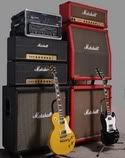Need some Tutoring
Moderator: VelvetGeorge
- Dax-The-Ax
- Senior Member
- Posts: 512
- Joined: Sun Dec 14, 2003 10:41 am
- Location: Tucson
Need some Tutoring
I can build and wire a superlead, thanks to George's diagrams, but i have no clue how thw Transformers and power work. Can you guys enlighten me. 110 volts come from the wall, Does this voltage go into the Mains Transformer and then it puts out the 470 or so Volts DC? If all you put in is 110, couldn't you use any tap off of the Mains? Say 220, 240 etc.. and you would still get 110? Or does the OT convert to the High DC Voltage? I just don't know how the shit works. Maybe this can be a Tube amp teaching post.
Dax
Dax

-
Billy Batz
- Senior Member
- Posts: 8566
- Joined: Fri Dec 10, 2004 8:49 pm
In pure laymans terms (which I am more or less) the power comes in from the wall at about 120vac (US) to the PT primary. Ive never bothered to learn about how transformers work though I do want to at this point. The PT secondary has at least a one winding for the heaters (in tube amps anyway) which is 6.3vac and one high voltage winding, lets say 500vac. You get a lead from each end of the winding. If its center tapped then you get a lead connected to exactly halfway between both ends (or as close as possible to exactly half.) With the CT its like 3.15-0-3.15 and 250-0-250. The HV secondary taps are AC voltage which is rectified to DC voltage in one of several ways. The filter caps and choke help to smooth out the voltage even more so that the amp is supplied as smooth and continuous a voltage as possible. The rectified DC voltage you get with 250-0-250ac depends on a) what type of rectifier (bridge, half wave, full wave) and b) what type of input (choke, capacitor, voltage doubler, etc..) Theres general guidelines as to how to get the DCB+ voltage from the HV secondary specs depending on what your using. Say like a 250-0-250 with a bridge rectifier and cap input. Something like 250 x 1.3. IE a Marshall 100W PT at 375-0-375 is 375 x 1.3 = 487vdc.
- Flames1950
- Senior Member
- Posts: 9294
- Joined: Sun Feb 08, 2004 1:04 am
- Location: Waukee, Iowa
Like many of us here I'm a little too "home-schooled" on these subjects as well, but my pathetic knowledge on how transformers work is kinda like this:
Any time you place a voltage across a wire or coil and run some current, you produce a magnetic field around that wire, and a coil produces an even better, stronger field. You can use that magnetic field to "induce" voltage potential (and hence current potential) into an adjacent wire or coil. (This is also why certain wires run too close to each other cause you problems.)
As far as the different secondaries, it's a matter of ratios as to why you have to have different taps for the wall voltage. A secondary coil that is designed to produce 375 VAC with a primary of 120 VAC will not produce that same voltage when 240 VAC is run through the primary. You have to re-size the primary coil so that you can allow for the different wall voltages and still get the desired voltages out of the secondary.
Any time you place a voltage across a wire or coil and run some current, you produce a magnetic field around that wire, and a coil produces an even better, stronger field. You can use that magnetic field to "induce" voltage potential (and hence current potential) into an adjacent wire or coil. (This is also why certain wires run too close to each other cause you problems.)
As far as the different secondaries, it's a matter of ratios as to why you have to have different taps for the wall voltage. A secondary coil that is designed to produce 375 VAC with a primary of 120 VAC will not produce that same voltage when 240 VAC is run through the primary. You have to re-size the primary coil so that you can allow for the different wall voltages and still get the desired voltages out of the secondary.

-
Billy Batz
- Senior Member
- Posts: 8566
- Joined: Fri Dec 10, 2004 8:49 pm
-
myker
- Senior Member
- Posts: 444
- Joined: Fri Sep 10, 2004 5:24 pm
yeah, you got it, then the science/math comes in... 
i am gonna try to post a drawing that shows very simplified how a transformer works. please someone correct me/explain a bit further. this is a subject alot of us would like to know more about im sure.
mike
i am gonna try to post a drawing that shows very simplified how a transformer works. please someone correct me/explain a bit further. this is a subject alot of us would like to know more about im sure.
mike
- Attachments
-
- Transformer.jpg
- (13.91 KiB) Downloaded 755 times
-
videocat23
- Senior Member
- Posts: 325
- Joined: Wed Sep 08, 2004 3:07 pm
- Location: Orlando, FL
- Contact:
from AC to DC thru a bridge redtifier, I always used
(Vac/0.707) - 1.4V = Vdc
Vac being the transformer secondary. 0.707 because it's a sine function and therefore you use 1/(sqrt2). 1.4 because you're going thru 2 diodes and it's 0.7V drop each.
(Vac/0.707) - 1.4V = Vdc
Vac being the transformer secondary. 0.707 because it's a sine function and therefore you use 1/(sqrt2). 1.4 because you're going thru 2 diodes and it's 0.7V drop each.
------------------------------------------
"Remember Bart, when participating in sporting events, it's not who wins or loses but how drunk you get..." Homer Simpson
"Remember Bart, when participating in sporting events, it's not who wins or loses but how drunk you get..." Homer Simpson
- VelvetGeorge
- Site Owner
- Posts: 7233
- Joined: Tue Oct 14, 2003 5:12 pm
- Just the numbers in order: 13492
- Location: The Murder Mitten
- Contact:


